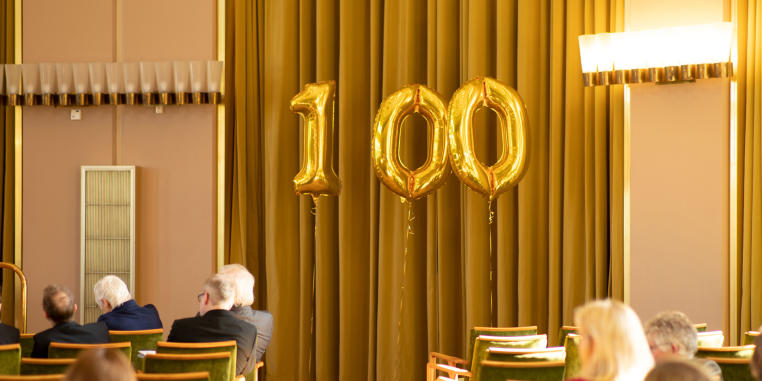
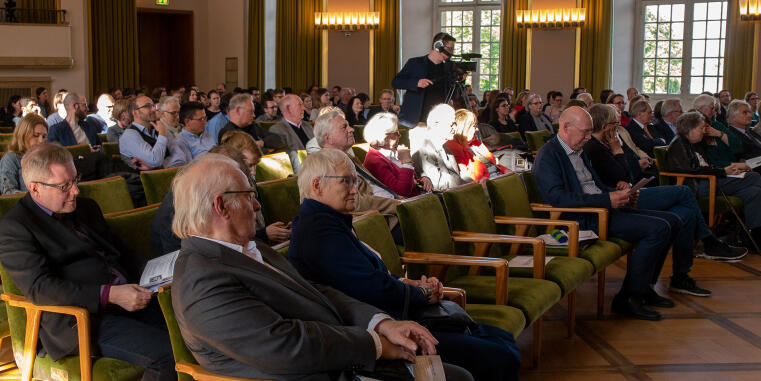
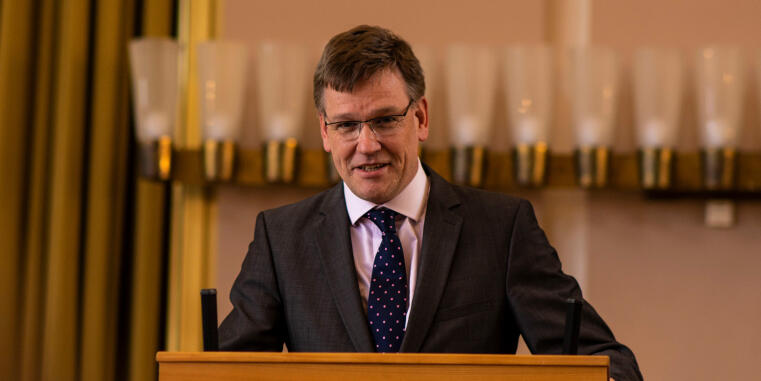
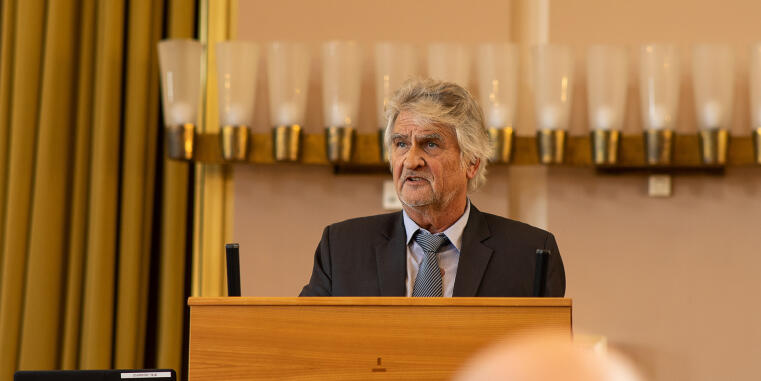
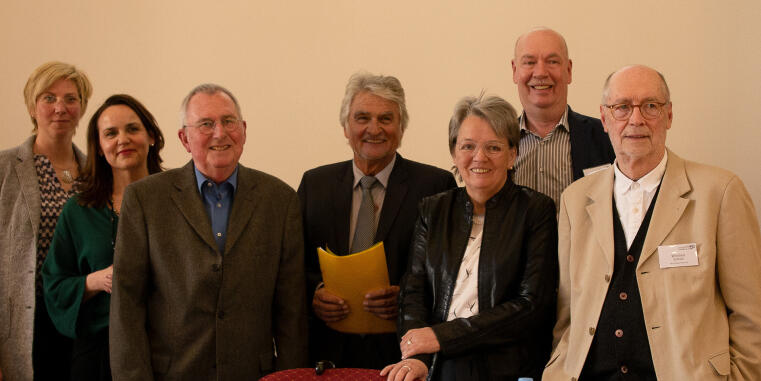
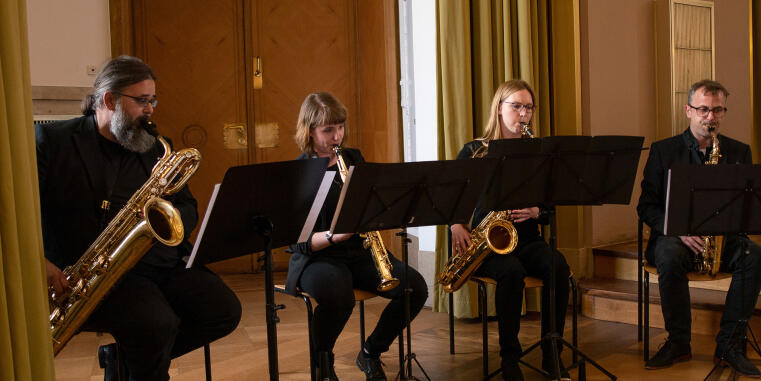
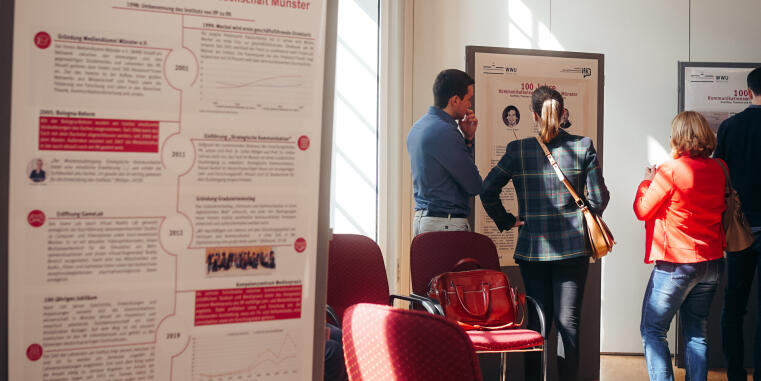
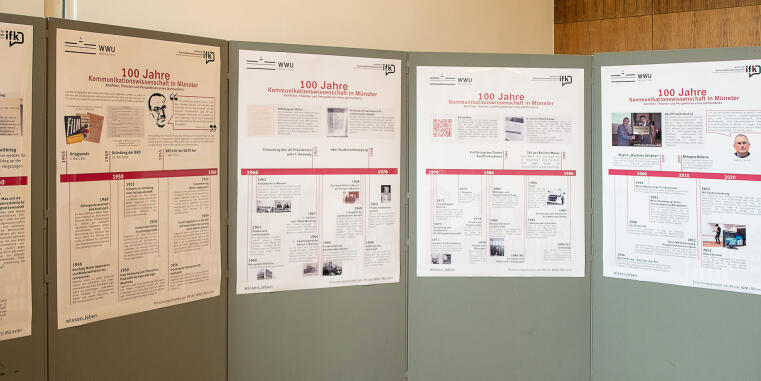
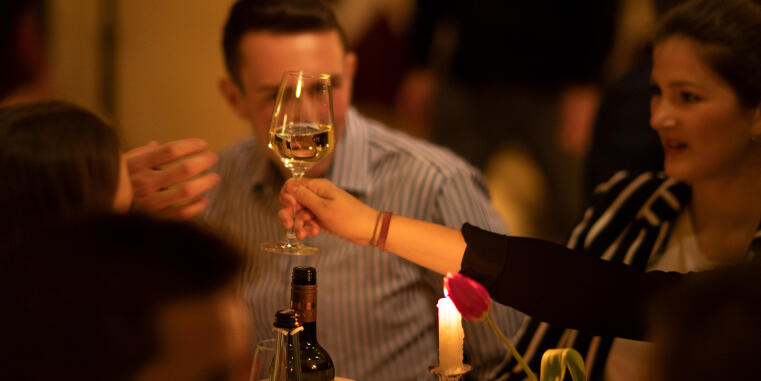









(13.05.2019) Flowers, golden balloons and musical accompaniment by the jBM Saxophone Quartet – it felt just like a real birthday. In this manner, the ceremony on the occasion of the 100th anniversary of the Department of Communication (IfK) was celebrated on Saturday, May 11th, at the Münster City Castle. Framed by a get-together and a poster exhibition showcasing the department’s history and – of course – a party, about 300 current and past IfK-members, as well as numerous guests jointly remembered the department’s evolution from its beginnings to its current state.
Johannes Wessels (Rector of the University of Münster) and Siegfried Weischenberg (Professor 1982–2000, former Managing Director if the IfK) congratulated on the 100th birthday. In his speech titled “Communication science as a martial art: Remarks concerning the present and history of the subject – from personal and geographical distance”, Weischenberg analysed the way (communication) scientists, departments and universities communicate. In doing so, he referred to the sociologists Max Weber, Niklas Luhmann und Pierre Bourdieu as well as to many anecdotes from the history of journalism- and communication studies. He concluded that the communication can be sometimes critical, conflictual, and even militant. In the course of the last 100 years the IfK itself experienced such clashes, some of which were even covered by the press. However, these turbulent times were not the core of Weischenberg’s retrospective. He stressed that the IfK managed to come out of these crises stronger than it was before and continued to improve its scientific reputation within the scientific community as well as amongst students. Finally, Weischenberg stated that it is worth to keep fighting and ended his speech with the words: “Everything is going to be okay, even if only after 100 years”.
Siegfried Weischenberg’s speech was followed by a discussion panel with Winfried Schulz (Professor from 1977–1983), Siegfried J. Schmidt (Professor 1997–2006, former managing director), Marianne Ravenstein (Academic Director 1989–2012) and Eva Baumann (Academic Councilor 2007–2010). Moderator Wiebke Loosen (University Assistant 1996–2000) used Weischenberg’s the speech as a starting point to prompt the panelists to recount the eventful phases in the history of the department from their own experience as well as their most formative memories.
After the ceremony at the City Castle, many of the guest continued to celebrate the department’s birthday at the party at the Schlossgarten Café.
Hier finden Sie einen Beitrag aus den Westfälischen Nachrichten zur Jubiläumsfeier des Instituts
Important foundations for the establishment of the Department of Communication in Münster were laid during WWI. In 1915 the historian Aloys Meister began creating a press archive and founded the interdisciplinary Committee for the Newspaper Industry, whose members regularly held lectures covering questions concerning the press. Only a few years later, in 1919, the Committee for Newspaper Affairs was founded and the journalist Friedrich Castelle served as its director. The Committee’s first private lecturer was Karl D’Ester. Unfortunately, the University had to end the program due to insufficient funding.
Funded by the Newspaper Publishing Association
The historian and director of the press office (Koblenz) Günther Wohlers founded the independent Department of Newspaper Affairs in 1927 with funds from the North Rhine-Westphalian Newspaper Publishing Association. Two years later, editor Heinrich Bause began managing the Department, which was renamed Department of News Publishing in 1935. The journalist Ernst H. Lehmann managed the Department from 1936–1938 and was succeeded by Hubert Max. Courses and research activities were halted during WWII. When they resumed in 1946, historian and journalist Walter Hagemann came to Münster to work as professor and director of the Department of News Publishing.
Expansion of the Subject under Hagemann
In 1949 the Department of News Publishing under Hagemann was renamed the Department of Journalism to take into account the new courses and syllabi. The Department of Journalism now covered all journalistic aspects and processes. Through Hagemann’s successful management, productivity, and enthusiasm, the Department of Journalism in Münster gained prestige and a good reputation.
After Hagemann’s suspension in 1959, his assistant Günter Kieslich became the Department’s director. Dutch sociologist Hendricus J. Prakke was appointed director in 1960. In introducing functional research methods and expanding the Department’s interests to include all communication studies, Prakke proved to be very prolific.
Reactions to Change: Renaming the Department
Prakke was succeeded by his student Winfried B. Lerg, who became acting director in 1969 and ordinarius and director in 1971. His term as director lasted 25 years and is the longest term served at this Department in Münster. Siegfried Weischenberg became director in 1994. The political scientist Dietrich Thränhardt served as director for a short period and was succeeded by (each successor serving a complete term): Siegfried J. Schmidt (1997); Miriam Meckel (1999); Siegfried J. Schmidt (2001); Bernd Blöbaum (2002); Christoph Neuberger (2007) Frank Marcinkowski (2009); Ulrike Röttger (2011)., Jutta Röser (2014), Thorsten Quandt (2012), Volker Gehrau has been managing the Department since 2018.
In 1998 the Department was renamed The Department of Communication to reflect developments in the field of communication. Additionally, the Department was divided into two divisions: media studies and journalism.